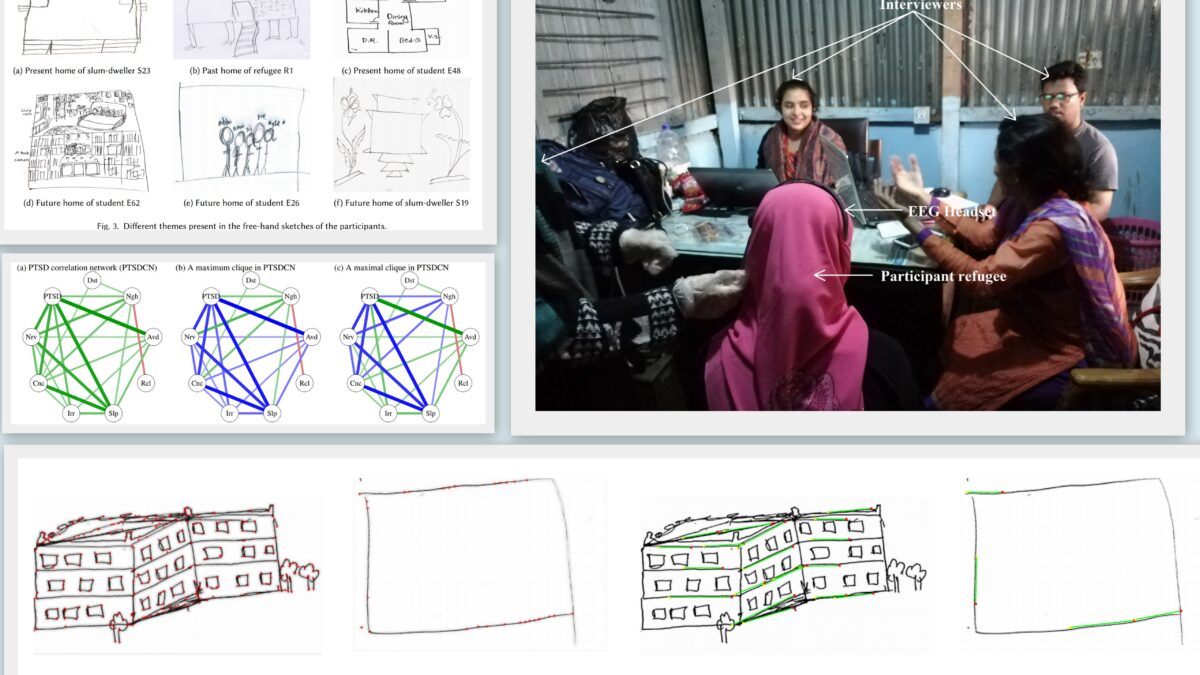Automated Diagnosis and Screening of PTSD
Analyzing the case of Rohingya refugees in Bangladesh, we propose a two-way diagnosis of PTSD as well as develop a novel, low-cost, and remote method to screen the potential cases of PTSD based on free-hand sketches.
Post-traumatic stress disorder (PTSD) is a psychiatric disorder. It often develops among some people who have been exposed to trauma and are experiencing psychiatric symptoms related to trauma. The existing diagnostic tools of PTSD are often difficult to administer within marginalized communities due to language and cultural barriers, lack of skilled clinicians, and stigma around disclosing traumatic experiences.
In a series of papers, by analyzing the case of Rohingya refugees in Bangladesh, the largest refugee camp in the world, we propose a two-way diagnosis of PTSD using (i) short inexpensive questionnaire to determine its prevalence and (ii) low-cost portable EEG headset to identify potential neurobiological markers of PTSD.
In a follow-up paper, we present an initial proof of concept for a novel, low-cost, and non-invasive method to screen the potential cases of PTSD based on free-hand sketches. Using corner and edge detection algorithms, we extracted three features (number of corners, number, and average length of strokes) from the images of free-hand sketches. We used these features along with sketch themes, participants’ gender and group to train multiple logistic regression models for potentially screening PTSD (accuracy: 82.9–87.9%). We improved the accuracy (99.29%) by integrating EEG data with sketch features in a Random Forest model for the refugee population.
Our proposed methods using 1) questionnaire, 2) low-cost portable EEG headset, and 3) free-hand sketches to diagnose PTSD could potentially be integrated with phones, improving medical access to the underrepresented communities.
Publications:
F. Shahid, W. Rahman, M. S. Rahman, S. Purabi, A Seddiqa, M. Mostakim, F. Feroz, T. R. Soron, F. Hossain, N. Khan, A. B. Islam, N. Paul, E. Hoque, A. Islam, Leveraging Free-Hand Sketches for Potential Screening of PTSD, Proceedings of ACM on Interactive, Mobile, Warble, and Ubiquitous Computing (IMWUT), September 2020.
F. Shahid, W. Rahman, A. B. Islam, N. Paul, N. Khan, M. S. Rahman, M. M. Haque, A. B. M. A. A. Islam, Two Tell-tale Perspectives of PTSD: Neurobiological Abnormalities and Bayesian Regulatory Network of the Underlying Disorder in a Refugee Context, Proceedings of ACM on Interactive, Mobile, Warble, and Ubiquitous Computing (IMWUT), London, September 2019.

